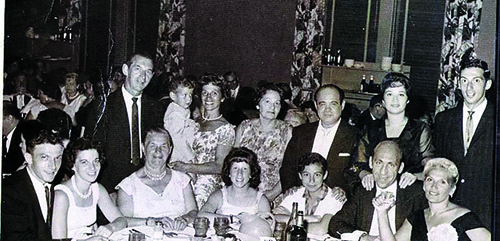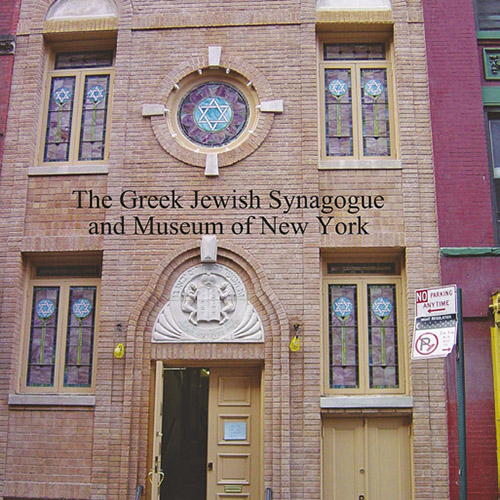

The Romaniote Jews of Greece are a unique Jewish community that have resided in Greece for millenia and are neither Sephardic or Ashkenazic. Their unique nusach (rite) is available for viewing at the website of the National Library of Israel at https://www.nli.org.il/he/books/NNL_ALEPH001163513/NLI.
According to Steven Bowman:
The term Romaniot stems from the self-identification of the Greek-speaking Orthodox Christian population of the Balkans as Rhomaioi (Romans), that is, descendants of the citizens of the Roman Empire, which continued in its Byzantine incarnation until 1453. As citizens of the empire, the Jews were also Rhomaioi (Greek) or Romani (Latin), hence Romaniot (Heb. romaniotim). As a minority in a hostile Christian environment, the Romaniot Jews were subject to restrictive laws and constant harassment by the Orthodox Church, which treated them as a foil to the triumphalism of Christianity…
Outside the capital, Romaniot communities flourished in Epirus and the Peloponnese. The Romaniot communities in the Ionian islands, the Archipelago, Crete and the Dodekanisoi (Dodecanese) came under the control of Venice. Genoa controlled Chios, and later the Angevins took the Ionian islands. The Romaniots in these areas became Italian-speaking until they were rejoined to the Greek kingdom in the 19th and 20th centuries. During the Ottoman period (Grk. Turkokratia) the Romaniots were under Turkish protection and usually lived within the walls of the kastro that controlled each city and town. The Jewish communities of the Peloponnese (also called Morea, which later included Boeotia and Attica) were destroyed in 1821 during the initial stage of the Greek Revolution. During the Holocaust, the Jewish inhabitants of the main Romaniot centers of Ioannina (Yanina) and Corfu were deported to their deaths in Auschwitz. Over 10,000 Romaniots (and over 50,000 Sephardim) were sent to Nazi concentration camps. About 8,000 members of the Greek-speaking communities of the mainland either served with the resistance or hid in the mountains, many under the protection of the resistance.
The question of a neo-Romaniot identity among contemporary Greek Jews, who are primarily Greek-speaking even if of Sephardi origin, is in a state of flux among locals and scholars. Romaniot Jewry is characterized by its use of Judeo-Greek, which preserves archaic elements (especially among Ioannina Jews) from its development over the past two millennia. Their synagogue rite is also unique to the regions from Corfu to the Black Sea (e.g., Machzor Romania, Machzor Korfu) and is characterized by the use of Greek and a highly developed liturgical poetry (piyyuṭim) that derives from Byzantine Palestine in late antiquity. Romaniot culture also further developed the midrashic tradition inherited from the Hellenistic period and from later Palestinian Jewish scholars. Kabbalah and philosophy were particularly studied during the late Byzantine and early Ottoman periods along with medicine, astronomy and Bible commentary. In addition, their customs present a mix of late antiquity Palestinian Jewry and contemporary Byzantine and post-Byzantine customs (primarily marriage, as in the medieval use of stephanomata [wreaths], and dowry arrangements), many of which are discussed by Joseph Caro in his Bet Yosef. This ancient Jewry, once numbering in the millions in Roman and Byzantine times, comprises only a few hundreds in modern Greece and perhaps a myriad of identifying descendants in its diaspora…
Romaniotes and Passover
They have always maintained a special relationship with the holiday of Passover. As a result, they took on the names that are associated with the holiday, as both personal names and surnames. Names like Pessah, Matza (a famous Greek-Jewish family in Israel), and Hametz are ubiquitous among them. I had the privilege of meeting a young Romaniote rabbinical student with this surname, Tzvi Hametz, some years back. Tzvi also mentioned to me that he knew of a Greek-Jewish family who took on the amusing surname of Kol Chamira. This Aramaic prayer כל חמירא וחמיעא is recited during the evening preceding the 14th of Nisan, and renders all the leftover unleavened bread in one’s property null and void. It was also recited by many on the day of the 14th, while burning the leftover chametz. The formula and translation follows (courtesy of Jewish in St. Louis):
Perform the search and gather up all the crumbs as a family project. Tie them in a bundle, which will be burned the next morning.
After the search, recite the following formula:
Kol chamira va-chami’ha d’ika vir’shuti, d’la chamitei u’d’la viartei u’d’la yadana lei livteil v’lehevei hefker k’afrah d’ar’ah.
All manner of leaven that is in my possession, that I have not seen or removed, shall be annulled and considered as the dust of the earth.
On Wednesday morning, recite the following as you burn the chametz.
Kol chamira va-chami’a d’ika virshuti, da-chazitei u’d’la chazitei d’chamitei u’d’la chamitei, d’viartei u’d’la viartei livteil v’lehevei hefker k’afra d’ar’ah.
All chametz in my possession, whether I have seen it or not, whether I have removed it or not, is hereby nullified and ownerless, as the dust of the earth.
A little online searching brought me to a webpage that was created by a member of this mentioned family https://www.colchamiro.net/ (the surname is spelled there Colchamiro).
According to one version of the family story, this is how the name came into being:
The story we always tell is that our ancestor was a rag merchant in Greece and was very meticulous about picking good scraps; that he would look through the goods as carefully as one looks for leaven on Passover. The prayer that one says after locating all leaven in the house is called “Kol Chamira” and so his friends and associates said he was so picky that he might as well say “Kol Chamira” over his rag finds. Supposedly he was known by this name in Greece and gave it when arriving at Ellis Island, and that the immigration officials invented their own spelling.
Professor Rae Dalven, who wrote a book on the Ioannina Romaniotes titled “The Jews of Ioannina,” writes:
“My mother’s maiden name was Kalchamira (spelled Colchamiro in the United States). The family explanation is that her father, a cloth merchant, used to examine material as closely as if he were searching for leaven (hametz). This was associated with the statement made the night before the eve of Passover, beginning “Kal Hamira de ika birshuti (May all leaven in my possession).”
Wishing everyone a chag kasher v’sameach!
The author is available for speaking engagements, writing gigs and tours. He can be contacted at yoelswe@gmail.com.









